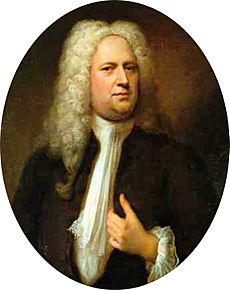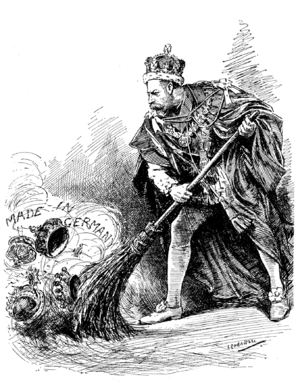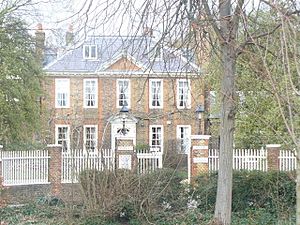Germans in the United Kingdom facts for kids
| Total population | |
|---|---|
| UK residents born in Germany 297,000 (2013 ONS estimate) German nationals 126,000 (2013 ONS estimate) |
|
| Languages | |
| British English and German | |
| Religion | |
| Catholicism · Lutheranism · Anglicanism | |
| Related ethnic groups | |
| Germans in Sweden |
Germans in the United Kingdom are one of the largest groups of people from other countries living there. Many people in Britain today, sometimes called German British, have German family roots. Even the British royal family has German ancestors! While many people born in Germany live in the UK, a lot of them are actually British citizens. They might have been born in Germany because their British military parents were working there.
Contents
A Look Back: German History in the UK
Germans have been coming to the UK for a long time. In the Middle Ages, merchants from the Hanseatic League (a group of trading cities) came to do business. Later, in the 1500s, some German Protestants moved to Britain. They were trying to escape religious wars in their home country.
By the late 1600s, a good number of Germans lived in Britain. Most were businessmen, often from Hamburg, or people who made sugar. They came looking for better work and opportunities.
In 1709 and 1710, thousands of Germans from a region called the Electorate of the Palatinate moved to England. French forces had invaded their home, and they had a very cold winter. Queen Anne's government invited them. The plan was for them to settle in the North American colonies. But some of them decided to stay in London.
German Royalty in Britain
A big change happened in 1714. George I, a German prince from Hanover, became the King of Britain. This started the British House of Hanover royal family. For many years after that, every British king or queen until Edward VII married someone of German background.
Edward VII's wife was a Danish princess with German family. His son married a British princess who also had mostly German ancestors. And Elizabeth II, a queen we know well, married Prince Philip, a Greek prince with mostly German roots.
The British Royal Family used to have a German last name, Saxe-Coburg-Gotha. But in 1917, during the First World War, people in Britain felt very anti-German. So, the Royal Family changed their name to the more English-sounding Windsor. King George V gave up all his German titles. The government also took away titles from three other British princes who had German connections. Even today, some people still joke about the Royal Family having German roots.
German Churches and Support
St George's, a Lutheran Church built in 1762/63, is the oldest German church in the UK. It was started by Dederich Beckmann, a rich sugar maker. For many years, it was a religious home for German immigrants. These immigrants often worked in sugar factories, or in meat and baking jobs in the East End.
During the time of the Nazis in Germany, St George's pastor, Julius Rieger, helped Jewish refugees. He gave them papers to travel safely to Britain. A famous anti-Nazi thinker, Dietrich Bonhoeffer, also worked with St George's. He was a pastor at a nearby church from 1933 to 1935.
Where Germans Live in the UK
The 2001 UK Census found that 266,136 people born in Germany lived in the UK. This made them the fourth-largest group born outside the UK. Many of these people were likely children of British military families. They were born in Germany when their parents were stationed there. Then they moved back to the UK with their families. Areas like Wiltshire, Colchester, North Yorkshire, and Aldershot have many army bases. These places had about 12,000 people born in Germany living there.
The 2011 UK Census showed similar numbers. There were 262,356 Germany-born people in England, 11,208 in Wales, 22,274 in Scotland, and 3,908 in Northern Ireland.
In 2013, the Office for National Statistics estimated that 297,000 people born in Germany lived in the UK. But they also said that 189,000 of these were British citizens. The total number of German citizens living in the UK, no matter where they were born, was about 126,000 in 2013.
Besides areas with army bases, many people born in Germany live in West London. This is especially true around Richmond, where there is a German school.
German Influence in British Life

German-British people and German speakers have made many important contributions to British life. They have helped create powerful family lines. Some places and buildings are even named after famous Germans. For example, Holbein Place in London is named after the Renaissance painter Hans Holbein the Younger. The Herschel Museum of Astronomy in Bath celebrates the life of William Herschel. He was a famous astronomer who discovered the planet Uranus in 1781.
In music, George Frideric Handel was one of the greatest composers of the Baroque period. He lived most of his adult life in England. He was asked to write four songs for the crowning ceremony of King George II. Handel became a British citizen in 1727.
Germans have also done very well in business. Backes & Strauss, the oldest diamond company in the world, was started in 1789 by German businessmen. In 1818, Johann Heinrich Schröder and his brother started Schroders in London. Today, it is one of the biggest investment banks in the world. In 1851, Paul Julius Reuter started the Reuters news agency. It is now one of the largest financial news organizations globally.
Ekkehard von Kuenssberg was the founder and president of the Royal College of General Practitioners. This is an important group for doctors in the UK.
Many influential families in the UK have German roots. The Freuds, for example, can trace their history back to Germany. The Freud Museum is named after the famous family leader, Sigmund Freud. John Jacob Astor, 1st Baron Astor of Hever, started the Astor family in England. The Battenberg family also has German origins. Prince Louis of Battenberg became a British citizen. His descendants include Louis Mountbatten, 1st Earl Mountbatten of Burma, and Prince Philip, Duke of Edinburgh, who was married to Queen Elizabeth II.
German Schools in the UK
The German School London helps German families living in London. It provides education for their children.
Famous Britons with German Family Roots
 | Jessica Watkins |
 | Robert Henry Lawrence Jr. |
 | Mae Jemison |
 | Sian Proctor |
 | Guion Bluford |



